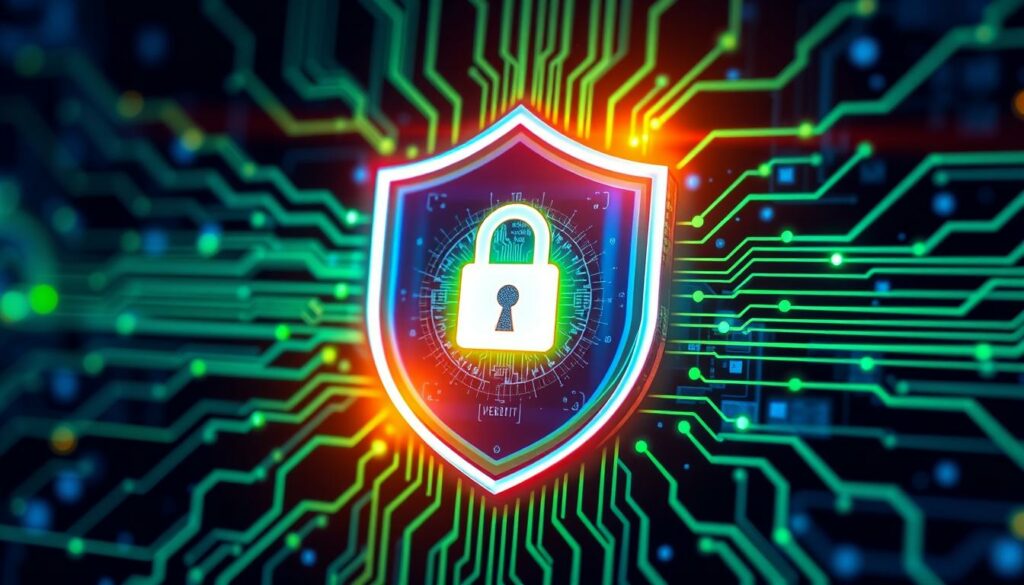Did you know that over 80% of organizations faced a breach in 2022? This shows we need strong defensive strategies more than ever. Ethical hackers, or white-hat hackers, use their skills to test systems. They help find weaknesses before bad actors can use them.
With tech trends like AI-capable PCs and advanced Linux system monitoring, organizations must update their security. Learning about ethical hacking can help protect your data. You’ll see how these hackers are key in making strong defense plans that protect companies from big problems.
Key Takeaways
- Over 80% of organizations faced a breach in 2022, highlighting the urgent need for ethical hacking.
- Ethical hackers identify vulnerabilities to prevent exploitation by malicious users.
- Understanding ethical hacking can significantly improve your cybersecurity measures.
- Ethical hacking techniques help organizations implement effective defense strategies.
- Staying informed about the latest cybersecurity threats is essential for organizational resilience.
Understanding Cybersecurity Threats
Cybersecurity threats are big risks for digital systems and sensitive data. Types like viruses, malware, and phishing schemes can harm personal and business data. It’s key to stay aware to fight these threats effectively.
Recent data breaches have shown how vulnerable organizations are. Big attacks have leaked thousands of personal details, hurting trust with customers and stakeholders. It’s vital to invest in strong cybersecurity to keep data safe and private.
It’s important for organizations to keep up with new cyber threats. A good plan includes training employees and strict security rules. Being proactive helps avoid cyber attacks.
| Cybersecurity Threat | Description | Impact |
|---|---|---|
| Ransomware | Malicious software that encrypts data, demanding payment for decryption. | Loss of access to critical data, financial losses from ransom payments. |
| Phishing | Deceptive emails or messages designed to steal sensitive information. | Identity theft, unauthorized access to accounts, financial fraud. |
| Data Breaches | Unauthorized access to confidential data, often resulting in data loss. | Legal repercussions, reputational damage, loss of customer trust. |
| Malware | Software designed to disrupt or damage systems and networks. | System failures, data loss, costly recovery efforts. |
Understanding the many cybersecurity threats is key for any organization. Putting cybersecurity first helps build a strong defense against attacks and data breaches.
The Importance of Ethical Hacking
In today’s digital world, ethical hacking is key. As cyber threats grow, having a strong cybersecurity plan is vital. Ethical hackers help by testing systems to find weak spots.
These experts, known as white hat hackers, use techniques like penetration testing. These methods help companies see where they might be open to attacks. By fixing these issues early, you can stop criminals from taking advantage of them. Famous hackers like Kevin Mitnick and Steve Wozniak show how ethical hacking helps keep the internet safe.
Managing risks is crucial for companies today. Adding ethical hacking to your security plan boosts your defenses and protects your data. This way, you stay ahead in the fast-changing tech world. It helps prevent big financial losses from data breaches.
| Aspect | Impact of Ethical Hacking |
|---|---|
| Identifying Vulnerabilities | Proactively detects weaknesses in systems before exploitation |
| Enhanced Cybersecurity Strategy | Strengthens defenses against emerging threats |
| Risk Management | Safeguards data, preventing financial losses from breaches |
| Compliance and Standards | Aids in meeting regulatory requirements and security standards |
| Reputation Protection | Maintains consumer trust by demonstrating a commitment to security |
What is Ethical Hacking?
Understanding the Definition of Ethical Hacking is key today. Ethical hacking means testing systems with permission to find weak spots. These hackers follow a strict code, unlike criminals. They aim to make systems more secure, not break them.
Ethical hackers do many things like penetration testing and security checks. They work to strengthen systems before hackers can break in. This Authorized Testing helps companies see their weak spots and fix them. It makes cybersecurity stronger.
With more need for cybersecurity skills, training is a must. A great resource is the Complete 2024 Cyber Security Expert Certification Training. For just $49.99, you get five advanced courses to prepare for big cybersecurity certifications. You’ll learn about security architecture and more. This training boosts your skills in ethical hacking, making you a top choice in the field.
In short, ethical hacking is key for strong security. Knowing the difference between ethical and bad hacking helps us tackle cybersecurity issues. It lets companies stay safe in the digital world.
Types of Ethical Hacking Techniques
Ethical hackers use many techniques to find weaknesses in systems. These methods help make cybersecurity better and keep organizations safe from threats. Some key Ethical Hacking Techniques are:
- Vulnerability Assessment: This method finds weaknesses in systems before bad guys can use them.
- Penetration Testing: Ethical hackers pretend to attack a system to test how strong it is and find weak spots.
- Web Application Testing: This focuses on web apps to find security issues that could lead to data theft.
- Social Engineering: This involves tricking people into sharing private info, often through fake emails or messages.
Using these techniques, companies can learn about their security level. Each method is important for making a strong cybersecurity plan. They help protect different parts of a system.
Penetration Testing: The Core of Ethical Hacking
Penetration Testing is key to Core Ethical Hacking. It’s about simulating cyber attacks to find weaknesses that bad guys could use. Knowing these weaknesses helps make your systems safer and protect important data.
The steps in Penetration Testing are:
- Planning: Setting the test’s goals and what to cover.
- Scanning: Finding open ports and services on the network.
- Gaining Access: Using weaknesses to see how deep a breach can go.
- Maintaining Access: Trying to keep a backdoor for future use.
- Analysis: Looking at the results and offering ways to fix them.
Penetration Testing helps your company check the security of different parts like:
- Web applications, looking for issues like SQL injection and XSS.
- Network security, finding weak spots in protocols and open ports.
- Wireless networks, checking for risks in Wi-Fi security.
- Mobile platforms, finding dangers in mobile operating systems.
- Cloud infrastructure, making sure security in API setups is right.
Here’s a table that shows different types of Penetration Testing and what they check for:
| Type of Hacking | Description | Example Vulnerabilities |
|---|---|---|
| Web Application Hacking | Finding weaknesses in web apps | SQL injection, XSS |
| Network Hacking | Using network security flaws | Open ports, weak protocols |
| Wireless Network Hacking | Targeting Wi-Fi security issues | WEP, WPA, WPA2 |
| Social Engineering | Using human psychology to exploit | Phishing attacks |
| Cloud Security Testing | Checking cloud system weaknesses | Unsecure APIs, wrong setups |
Regular Penetration Testing helps companies get stronger and ready for cyber threats. It finds and fixes weaknesses, making the security better for any business today.
How Ethical Hacks Identify Vulnerabilities
Ethical hacking is key in finding identifying vulnerabilities in systems. Ethical hackers use special tools and methods to find weak spots that bad guys could use. They often use scanners to check systems for security issues and mistakes.
Manual testing is another big part of ethical hacking. Experts try to attack systems like real attackers would. This helps them see how systems react and find security problems. Then, these issues can be fixed before they cause trouble.
Today, companies face threats from smart cybercriminals, like Cicada3301. This group uses new ways to target files and gets into networks with tools like Brutus botnet. Knowing about these threats shows why ethical hack methods are crucial for defense.
Adding ethical hacking to your security plan helps find problems before they get worse. Here’s a quick look at what ethical hacking includes:
| Method | Description |
|---|---|
| Vulnerability Scanning | Automated tools check systems for known security issues. |
| Manual Testing | Simulated attacks to see how systems react and defend. |
| Social Engineering | Tests how employees react to trickery. |
In short, ethical hacking is vital for protecting against threats. Using strong ethical hack methods boosts your defense against cyber risks like Cicada3301. For more on cyber threats, check out this article on Cicada3301 and its tactics.

Regulatory Compliance and Ethical Hacking
In today’s digital world, Regulatory Compliance is key for ethical hacking. Companies must follow strict Cybersecurity Regulations set by laws like PCI DSS, HIPAA, and GDPR. These rules help protect sensitive data and keep industries safe.
Ethical hacking is crucial for companies aiming to meet these standards. Ethical hackers check for security weaknesses and point out where companies might not be up to par with Ethical Hacking Standards. This helps fix compliance issues and boost security.
Adding ethical hacking to your compliance plan has many benefits:
- Finding security weaknesses before others can.
- Building trust with customers by showing a strong security focus.
- Reducing the risk of data breaches and big fines.
Companies that use ethical hacking often improve their risk management. Working together, security teams and ethical hackers keep a watchful eye. This approach helps firms stay ahead of new threats and changing laws.
The mix of Regulatory Compliance and ethical hacking builds a strong defense for protecting sensitive info. By following Cybersecurity Regulations, you can use ethical hacking to keep your company safe. This also helps create a secure online space for everyone involved.
| Compliance Regulation | Focus Areas | Role of Ethical Hacking |
|---|---|---|
| PCI DSS | Payment Security | Ensuring secure transactions through vulnerability assessments. |
| HIPAA | Healthcare Data Protection | Identifying areas of non-compliance in patient data security. |
| GDPR | Data Privacy | Proactively addressing risks related to personal data protection. |
The Benefits of Incorporating Ethical Hacking in Organizations
Adding ethical hacking to your company has big benefits for cybersecurity. It helps find weaknesses before bad guys can use them. This way, you can fix problems before they cause harm, making your data safer.
It also makes employees more aware of cyber threats. When everyone knows the risks, they can help protect your data better. This makes your company more secure overall.
Another big plus is saving money. Ethical hacking can stop data breaches, which can be very costly. Companies that use ethical hacking save about $500,000 a year by avoiding these problems.
It also helps with following the law. There are strict rules for keeping data safe. Ethical hackers make sure you meet these rules, showing you care about security.

Companies that use ethical hacking get better at keeping data safe and responding to threats. They can handle breaches 30% faster than those without it. This means less damage and more trust from customers.
Trust from customers means they stick around. Surveys show that being open about ethical hacking makes your brand look better. It shows you’re serious about keeping data safe, which builds trust with your customers.
| Benefit | Details |
|---|---|
| Cybersecurity Improvement | Identification of vulnerabilities before exploitation |
| Employee Awareness | Enhanced understanding of potential threats |
| Cost Savings | Averaged $500,000 saved per year from prevented breaches |
| Regulatory Compliance | Improved adherence to legal standards, enhancing credibility |
| Incident Response | 30% faster breach response times |
| Customer Trust | 15% increase in customer loyalty due to security initiatives |
Choosing the Right Ethical Hacking Services
In today’s cybersecurity world, picking the right ethical hacking services is key to keeping your organization safe. With many ethical hacking providers out there, it’s important to choose wisely. Look at their skills, reputation, and qualifications before you decide.
Start by checking the certifications and experience of the ethical hacking providers. A good provider usually has certifications like Certified Ethical Hacker (CEH) or Offensive Security Certified Professional (OSCP). These certifications show they know their stuff. Also, experience in certain industries can be a big plus, as they understand the unique security issues those sectors face.
When looking at service selection, get to know the methods these providers use. Learn about the ethical hacking techniques they use. This way, you can make sure their methods fit your organization’s needs and goals, leading to better security.
It’s also important to compare the costs of different services. While cost shouldn’t be the only thing you consider, it’s important to make sure you’re getting good value for your money. Doing a cost-benefit analysis can help you find the best ethical hacking services for your business.
| Criteria | Provider A | Provider B | Provider C |
|---|---|---|---|
| Certifications | CEH, OSCP | CEH | OSCP, CISM |
| Industry Experience | 10 years in finance | 5 years in retail | 8 years in healthcare |
| Methodologies Used | Pentest, social engineering | Pentest | Red teaming, vulnerability assessments |
| Estimated Costs | $12,000 | $8,000 | $15,000 |
This comparison shows why picking the right service selection is so important. It helps you find the ethical hacking provider that meets your needs. In a world where cyber threats are always changing, making a smart choice can really boost your organization’s security.
Real-world Examples of Ethical Hacking Success
Many organizations have made big strides thanks to ethical hacking. Case studies show how these efforts boost security and fight off cyber threats. IBM is a great example, using ethical hacking to keep data safe and build trust with customers. Their work has found weaknesses and made security stronger across different areas.
Microsoft also saw big wins with ethical hacking. They improved how users log in by focusing on security. This made it harder for hackers to guess usernames and passwords. It’s a great example of how ethical hacking can turn weaknesses into strengths.
Even small businesses can gain from ethical hacking. Startups, for example, face unique security challenges. Ethical hacking helps them create tailored security plans that keep them agile. It lets small businesses stay competitive in the tough world of cybersecurity.
Here are some examples of how ethical hacking has helped organizations:
| Company | Initiative | Outcome |
|---|---|---|
| IBM | Integration of ethical hacking into cybersecurity strategy | Strengthened defenses and enhanced data protection |
| Microsoft | Improvement of authentication processes | Reduced vulnerabilities and increased user security |
| Startup XYZ | Custom security assessment with ethical hacking services | Enhanced security posture and risk mitigation |
These stories show that ethical hacking is a real strategy that brings big benefits. Looking into these case studies gives us insights. It shows how ethical hacking can change security plans and lead to lasting success.
Conclusion
In conclusion, ethical hacking is key in today’s complex cybersecurity world. It’s important to know how ethical hacking helps improve cybersecurity. Ethical hackers find and fix vulnerabilities, protecting your organization from hackers.
Using ethical hacking makes your organization more trustworthy and secure. This is crucial in our connected world. As new threats come up, ethical hacking will be vital for keeping businesses and people safe.
Ethical hacking is more than just fixing problems after they happen. It’s a proactive way to keep your organization secure and trusted. By focusing on ethical hacking, you stay ahead of threats.
FAQ
What is ethical hacking?
Ethical hacking means testing systems for weaknesses with the owner’s okay. It’s different from malicious hacking because ethical hackers follow rules to make systems safer.
How does ethical hacking enhance cybersecurity?
Ethical hacking makes systems safer by finding and fixing weaknesses before bad guys can. It uses fake attacks to show where systems are weak.
What are the main techniques used in ethical hacking?
Ethical hackers use many techniques. These include checking for weaknesses, testing systems, and using social engineering to find threats.
Why is penetration testing considered the core of ethical hacking?
Penetration testing is key because it tests systems by trying to break in. It helps companies see where they’re weak.
What role does regulatory compliance play in ethical hacking?
Rules are important in ethical hacking. Companies must follow laws, and ethical hacking checks if they do. It helps fix any issues.
What benefits can organizations expect from ethical hacking?
Companies gain a lot from ethical hacking. They get better security, their teams learn about threats, and they save money by avoiding big data breaches.
How should organizations choose the right ethical hacking services?
Companies should look at the skills and trustworthiness of ethical hacking teams. They should check their certifications and past work. It’s also key to compare what they offer, how they work, and the cost.
Can you provide real-world examples of ethical hacking success?
Yes, big names like IBM and Microsoft have used ethical hacking well. Their stories show how it helps stop data breaches and makes systems safer.
How does ethical hacking contribute to risk management?
Ethical hacking finds weak spots in systems. This lets companies take steps to keep data safe and avoid big losses from cyber attacks.
What distinguishes ethical hacking from criminal hacking?
The big difference is the reason and permission. Ethical hackers get okay to test and aim to make things safer. Criminal hackers don’t ask and want to harm for their own gain.
Source Links
- AMD Strengthens Its Corporate Responsibilities Initiatives
- You’re facing potential AI algorithm vulnerabilities. How do you inform the public effectively?
- Research links 17th century shipwreck to ‘Pirates of the Caribbean’
- How lessons from 2016 led officials to be more open about Iran hack this year
- Hackers Tapping into Company Systems to Test Security Features | HackerNoon
- Investing the Role of Artificial Intelligence in Advanced Sustainable Development Goals: Evidence from Banks in Bahrain
- Laceration Closure Devices Market Booming Worldwide With Leading Key Players – 3M, Medline Industries, Inc., B. Braun Melsungen AG, Medtronic, Smith & Nephew, Johnson & Johnson
- Future cybersecurity professionals can avoid costly courses in this deal
- Not all hackers are bad: Discover the positive impact of ethical hackers in cybersecurity
- Dental Floss Industry is Expected to Reach Huge Growth by 2031 – Procter & Gamble, Colgate-Palmolive Company, Johnson & Johnson Services, Inc., Prestige Consumer Healthcare, Inc., Dr Fresh, LLC
- Disposable EEG Electrode Market to Witness Huge Growth by 2031 – Medtronic PLC, CONMED Corporation, Natus Medical Incorporated, Brain Scientific, Inc., Ambu A/S, BIOPAC Systems Inc
- What is Ethical Hacking? A Comprehensive Guide [Updated]
- Importance of Types of Networks: LAN, MAN, and WAN | Simplilearn
- 25 Basic Linux Commands For Beginners – GeeksforGeeks
- Hollywood lobs bombshell in US presidential race with Donald Trump biopic
- Cicada3301: A New Ransomware-as-a-Service Operation | Black Hat Ethical Hacking
- Venkate Exchange: Leading the Charge in the Future of Cryptocurrency Trading
- Maximize Efficiency with Advanced Project Time Tracking Solutions from DeskTrack – Tech Guest Posts
- Forgotten Password? Top Tips to Remember Your App Passwords
- As fast as some jobs are growing, others are losing steam
- Titanic expedition yields lost bronze statue, high-resolution photos and other discoveries
- Ethical Hacking Diaries # 2pt.3: Enumeration
- The Future of AI and Ethics: Navigating the Balance Between Innovation and Responsibility
- Complete Network Hacking Course 2024 – Beginner to Advanced – CourseVania
- How to Become an Ethical Hacker in 2024?
- Budgeting and Cost Control for IT Projects: My Expert Advice
- Learn How to Manage IT Projects Effectively with My Advice
- I Share My Best Data Backup Strategies Using Cloud Storage
- I Learned About AI Mistakes That Could Change Your Life
- Sustainable & Green Energy Solutions for Next‑Gen Data Centers Trend Report
Related posts:
 Access Control Concepts: Safeguarding Systems and Data in Cybersecurity
Access Control Concepts: Safeguarding Systems and Data in Cybersecurity
 AI in Cybersecurity: The New Frontier in Protecting Data
AI in Cybersecurity: The New Frontier in Protecting Data
 Zero Trust Security: Why It’s Essential in Today’s Cyber Landscape
Zero Trust Security: Why It’s Essential in Today’s Cyber Landscape
 CISSP Domain 3: Security Architecture and Engineering
CISSP Domain 3: Security Architecture and Engineering
 CISSP Domain 4: Communication and Network Security
CISSP Domain 4: Communication and Network Security
 CISSP Domain 6: Security Assessment and Testing Guide
CISSP Domain 6: Security Assessment and Testing Guide
